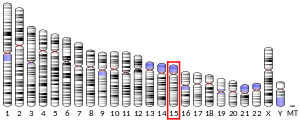
KNOWPIA
WELCOME TO KNOWPIA
Summary
PCNA-associated factor is a protein that in humans is encoded by the KIAA0101 gene.[5][6][7]
| PCLAF | |||||||||||||||||||||||||||||||||||||||||||||||||||
|---|---|---|---|---|---|---|---|---|---|---|---|---|---|---|---|---|---|---|---|---|---|---|---|---|---|---|---|---|---|---|---|---|---|---|---|---|---|---|---|---|---|---|---|---|---|---|---|---|---|---|---|
| |||||||||||||||||||||||||||||||||||||||||||||||||||
| Identifiers | |||||||||||||||||||||||||||||||||||||||||||||||||||
| Aliases | PCLAF, L5, NS5ATP9, OEATC, OEATC-1, OEATC1, PAF, PAF15, p15(PAF), p15/PAF, p15PAF, KIAA0101, PCNA clamp associated factor | ||||||||||||||||||||||||||||||||||||||||||||||||||
| External IDs | OMIM: 610696 MGI: 1915276 HomoloGene: 8829 GeneCards: PCLAF | ||||||||||||||||||||||||||||||||||||||||||||||||||
| |||||||||||||||||||||||||||||||||||||||||||||||||||
| |||||||||||||||||||||||||||||||||||||||||||||||||||
| |||||||||||||||||||||||||||||||||||||||||||||||||||
| |||||||||||||||||||||||||||||||||||||||||||||||||||
| |||||||||||||||||||||||||||||||||||||||||||||||||||
| Wikidata | |||||||||||||||||||||||||||||||||||||||||||||||||||
| |||||||||||||||||||||||||||||||||||||||||||||||||||
Interactions edit
References edit
- ^ a b c GRCh38: Ensembl release 89: ENSG00000166803 – Ensembl, May 2017
- ^ a b c GRCm38: Ensembl release 89: ENSMUSG00000040204 – Ensembl, May 2017
- ^ "Human PubMed Reference:". National Center for Biotechnology Information, U.S. National Library of Medicine.
- ^ "Mouse PubMed Reference:". National Center for Biotechnology Information, U.S. National Library of Medicine.
- ^ a b Yu P, Huang B, Shen M, Lau C, Chan E, Michel J, Xiong Y, Payan DG, Luo Y (Jan 2001). "p15(PAF), a novel PCNA associated factor with increased expression in tumor tissues". Oncogene. 20 (4): 484–9. doi:10.1038/sj.onc.1204113. PMID 11313979.
- ^ Simpson F, Lammerts van Bueren K, Butterfield N, Bennetts JS, Bowles J, Adolphe C, Simms LA, Young J, Walsh MD, Leggett B, Fowles LF, Wicking C (Jan 2006). "The PCNA-associated factor KIAA0101/p15(PAF) binds the potential tumor suppressor product p33ING1b". Experimental Cell Research. 312 (1): 73–85. doi:10.1016/j.yexcr.2005.09.020. PMID 16288740.
- ^ "Entrez Gene: KIAA0101 KIAA0101".
Further reading edit
- Shi L, Zhang SL, Li K, Hong Y, Wang Q, Li Y, Guo J, Fan WH, Zhang L, Cheng J (Feb 2008). "NS5ATP9, a gene up-regulated by HCV NS5A protein". Cancer Letters. 259 (2): 192–7. doi:10.1016/j.canlet.2007.10.029. PMID 18068894.
- Guo M, Li J, Wan D, Gu J (2006). "KIAA0101 (OEACT-1), an expressionally down-regulated and growth-inhibitory gene in human hepatocellular carcinoma". BMC Cancer. 6: 109. doi:10.1186/1471-2407-6-109. PMC 1483895. PMID 16646990.
- Mizutani K, Onda M, Asaka S, Akaishi J, Miyamoto S, Yoshida A, Nagahama M, Ito K, Emi M (May 2005). "Overexpressed in anaplastic thyroid carcinoma-1 (OEATC-1) as a novel gene responsible for anaplastic thyroid carcinoma". Cancer. 103 (9): 1785–90. doi:10.1002/cncr.20988. PMID 15789362.
- Petroziello J, Yamane A, Westendorf L, Thompson M, McDonagh C, Cerveny C, Law CL, Wahl A, Carter P (Oct 2004). "Suppression subtractive hybridization and expression profiling identifies a unique set of genes overexpressed in non-small-cell lung cancer". Oncogene. 23 (46): 7734–45. doi:10.1038/sj.onc.1207921. PMID 15334068.
- Nagase T, Miyajima N, Tanaka A, Sazuka T, Seki N, Sato S, Tabata S, Ishikawa K, Kawarabayasi Y, Kotani H (1995). "Prediction of the coding sequences of unidentified human genes. III. The coding sequences of 40 new genes (KIAA0081-KIAA0120) deduced by analysis of cDNA clones from human cell line KG-1". DNA Research. 2 (1): 37–43. doi:10.1093/dnares/2.1.37. PMID 7788527.








